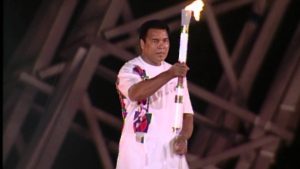
There he was, a symbol of greatness, trembling as he lit the 1996 Olympic cauldron. What the public saw, though, wasn’t a broken idol. Beyond the shaking, they saw courage. They saw an American icon whose legendary status had been on the rise since winning gold at the Olympics more than four decades earlier.
The Atlanta Olympics was one of the most public displays of Muhammad Ali’s Parkinson’s disease since he was diagnosed 12 years earlier. The boxing great, who died Friday at 74, would spend the next two decades after that surprise appearance using his fame to raise awareness and fight for a cure.
“While Muhammad Ali is best known as one of the greatest athletes of our time, we will always remember him as one of the strongest fighters in the Parkinson’s community,” Dr. Michael S. Okun, national medical director of the National Parkinson Foundation, said in a statement. “Ali brought the critically needed international attention to Parkinson’s disease and this awareness served as the catalyst for advances in education, care and research.”
There is no cure for Parkinson’s disease, which is a neurodegenerative brain disorder often manifested by incontrollable movements and emotions. For Ali, his disease could be seen in his shaking hands. Once known as the “Louisville Lip,” Parkinson’s slurred Ali’s speech (he stopped speaking in public during his later years). It made his facial muscles rigid, stifled his gait, impacted his sleep, and at times, hampered his breathing, according to an AARP interview with his wife, Yolanda “Lonnie” Ali.
“Parkinson’s has taken away a lot from this man — a lot that would put people in bed, make them cover their heads and never look up,'” Lonnie told AARP in 2014.
Read more about Ali’s struggle with the disease at Mashable.




